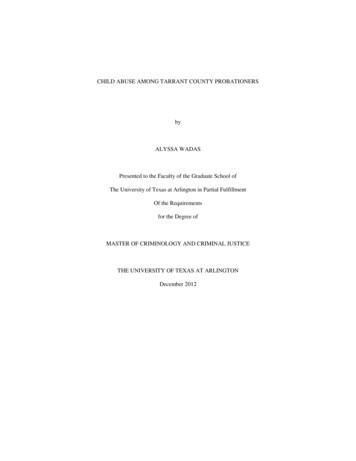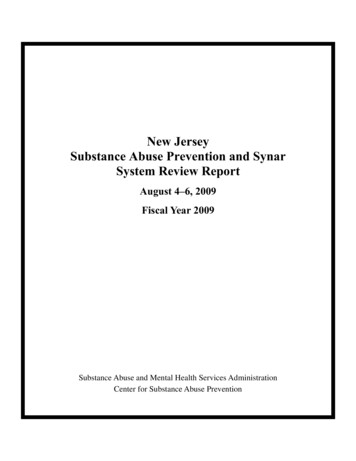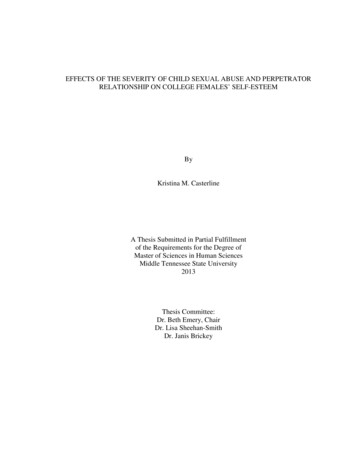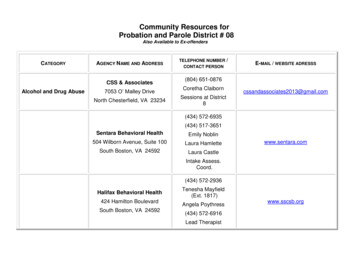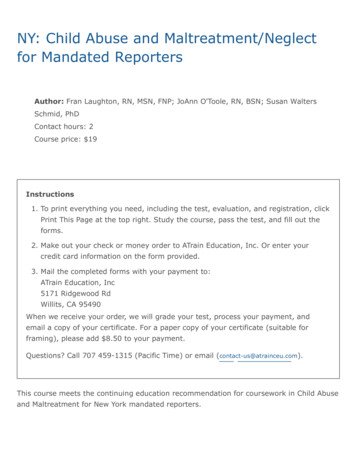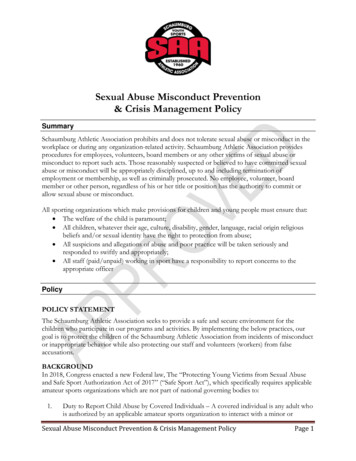
Transcription
The Stronger Child Abuse Prevention and Treatment ActSection 1 – Short titleThis Act is called the “The Stronger Child Abuse Prevention and Treatment Act.”Section 2 – Table of ContentsThis section provides the table of contents of the bill.TITLE I – GENERAL PROGRAMSection 101 – Repeal of FindingsThis section repeals Section 2 (Congressional Findings) of the “Child Abuse and Prevention Treatment Act”(CAPTA).Section 102 – Repeal of Advisory Board on Child Abuse and NeglectThis section repeals Section 102 (Advisory Board on Child Abuse and Neglect) of CAPTA.Section 103 – National Clearinghouse for Information Relating to Child AbuseThis section amends Section 103 of CAPTA to require the Secretary of Health and Human Services (HHS) todevelop and issue regulations establishing uniform national standards for tracking and reporting of childfatalities and near-fatalities resulting from child abuse and neglect through negotiated rulemaking. Thisprovision would permit all states to maintain current definitions or descriptions of such fatalities for all purposesother than tracking and reporting.Section 104 – Research and Assistance ActivitiesThis section amends Section 104 of CAPTA to: Update and streamline allowed topics for research and technical assistance conducted by the Secretaryof HHS to focus on issues that have been understudied and are relevant to current challenges faced bythe child welfare workforce. These updated research topics include:o Disseminating evidence-based treatments for individuals and families experiencing trauma dueto child abuse or neglect;o Improving outcomes for families experiencing domestic violence or substance use disorders; ando Determining methods for ensuring all families, regardless of racial background, are served in thechild welfare system. Repeal demonstration grants, which will be funded through grants in Section 105.1
Section 105 – Grants to States, Indian Tribes or Tribal Organizations, and Public or Private Agencies andOrganizationsThis section amends Section 105 of CAPTA to: Update and streamline the purposes of grants made under this section to focus on providing effectivetreatment and prevention services. Topics of focus for such grants include:o Providing professional development for workers in the prevention, identification, and treatmentof child abuse and neglect;o Addressing traumatic stress in families who experience high levels of adverse childhoodexperiences;o Improving coordination within the child welfare system;o Reducing findings of child neglect due to the economic insecurity of a family;o Improving primary prevention programs at the community level; ando Developing education for mandatory reporters. Require that projects funded through grants under this section establish quantifiable goals and submitto the Secretary of HHS an evaluation of effectiveness. Require that the Secretary of HHS only award continuing grants to projects that demonstrateeffectiveness.Section 106 – Grants to States for Child Abuse or Neglect Prevention and Treatment ProgramsThis section amends Section 106 of CAPTA to: Update and streamline the purposes of state grants meant to improve and support child protectiveservice systems to focus on helping states provide effective services and develop an educated workforce. Update the requirements of state plans to ensure that states develop thorough, strategic plans to treatand prevent child abuse and neglect in consultation with families and professionals involved in childwelfare systems. Require that all states establish three citizen review panels and require that reports from citizen reviewpanels to the state and the public include certain information.Section 107 – Miscellaneous RequirementsThis section amends section 108 of CAPTA to require that state task forces established under Section 107 ofcurrent CAPTA law make recommendations to their state for how to detect and prevent systemic child sexualabuse. The recommendations will also: Highlight best practices for providing age appropriate education for children, and education for parentsabout risk factors or signs of potential child sexual abuse; Examine current state laws addressing child sexual abuse; and Examine the feasibility of making available the relationship of the perpetrator to the victim.The task force is required to submit such recommendations to the state and the state is required to report tothe Secretary of HHS the status of adopting such recommendations.Section 108 – ReportsThis section amends Section 110 of CAPTA to repeal studies that have been previously completed and requiresthe Secretary of HHS to carry out a new study examining the challenges to and best practices for the scalabilityof treatments that ameliorate the trauma resulting from child abuse and neglect and reduce revictimization.The Secretary of HHS is required to provide the Committee on Education and Labor of the House a reportsummarizing the results of the study no later than three years after the enactment of the CAPTA ReauthorizationAct of 2019.2
Section 109 – Authorization of AppropriationsThis section amends Section 112 of CAPTA to set the authorization level for Title I at 270 million for fiscal year2020 and such sums as may be necessary for fiscal years 2021 through 2025. The section also places a cap of 100 million on discretionary activities and requires states to use no more than two percent of appropriationsexceeding fiscal year 2019 levels on administrative expenses.Section 110 – National Electronic Interstate Data Exchange SystemThis section requires the Secretary of HHS to establish a national electronic interstate data exchange systemthat allows states to share information from their child abuse and neglect registries with other states. Prior torolling out the data exchange system nationwide, the Secretary must convene a working group to providerecommendations on best practices for data sharing and must conduct a pilot of the data exchange system.States that receive funds from grants outlined in Sections 105, 106, or 107 are required to participate in thenational electronic interstate data exchange system, to the fullest extent possible, by 2027. There are 8 millionauthorized to carry out the work of this section.Section 111 – Technical and Conforming AmendmentsThis section makes technical and conforming amendments to CAPTA.TITLE II – COMMUNITY-BASED GRANTS FOR THE PREVENTION OF CHILD ABUSE AND NEGLECTSection 201 – Purpose and AuthorityThis section amends Section 201 of CAPTA to: Establish the purposes of Title II as: 1) establishing and maintaining support for community-based familystrengthening services and statewide systems-building approaches that ensure the development,operation, expansion, coordination, and evaluation of services, initiatives, programs, and activities thatprevent child abuse and neglect, and 2) promoting improved access for diverse populations. Update the purposes of Title II grants to focus on the development of statewide networks of familystrengthening services that provide a continuum of preventive services.Section 202 – EligibilityThis section amends Section 202 of CAPTA to ensure Governors consider all entities requesting to be designatedas lead entities and to ensure that the lead entity has demonstrated ongoing meaningful partnerships withparents and will work in partnership with vulnerable and diverse populations.Section 203 – Amount of GrantThis section amends Section 203 of CAPTA to increase the reservation for Indian tribes and tribal organizationsand migrant programs to five percent, except during years when increasing the reservation would cause thetotal amount allotted to states to be lower than the amount allotted in fiscal year 2019. This section also requiresthe lead entity to use no more than four percent of appropriations exceeding fiscal year 2019 levels onadministrative expenses.3
Section 204 – ApplicationThis section amends Section 204 of CAPTA to: Update the term “community-based and prevention-focused programs and activities designed tostrengthen and support families” to “community-based family strengthening services.” Require states to describe their capacity to involve parents in decision making and their plan for carryingout the requirements of this title. Require states to describe how they plan to incorporate evidence-based research in the process ofselecting community-based programs. Require states to provide an assurance that when issuing regulations to improve community-basedfamily strengthening services, states take into account how new regulations impact activities under thisact in an effort to avoid duplication, minimize compliance costs, and maximize local flexibility, whenappropriate.Section 205 – Local Program RequirementsThis section amends Section 205 of CAPTA to: Require that grants from the lead agency be used to develop, implement, operate, expand, and enhancecommunity-based family strengthening services designed to prevent child abuse and neglect. Require that, in awarding grants, the lead agency consider the grantee’s capacity to address theidentified needs of the community and to form collaborations with parents and other service providers. Require that funds from the lead agency be used for community-based family-strengthening servicesdesigned to prevent child abuse and neglect, which may include a variety of activities.Section 206 – Performance MeasuresThis section amends section 206 of CAPTA to update the term “community-based and prevention-focusedprograms and activities designed to strengthen and support families” to “community-based familystrengthening services” and to require that states report specific data on the number of programs funded andthe number of families served to the Secretary of HHS.Section 207 – National Network for Community-Based Family Resource ProgramsThis section amends Section 207 of CAPTA to restrict funds for technical assistance to no more than 5 percentof appropriations for this title.Section 208 – DefinitionsThis section amends Section 208 of CAPTA to update the term “community-based and prevention-focusedprograms and activities to prevent child abuse and neglect” to “community-based family strengtheningservices.”Section 209 – Rule of ConstructionThis section creates a special rule so that no grandparents, kinship care providers, foster parents, adoptiveparents, or persons acting in a parental role can be prohibited from receiving or participating in services fundedunder this title.Section 210 – Authorization of AppropriationsThis section amends section 209 of CAPTA to set the authorization level for Title II at 270 million for fiscal year2020 and such sums as may be necessary for fiscal years 2021 through 2025. This section also allows states toprovide in-kind contributions towards the amount of the state match that exceeds the state match in fiscal year2019.4
Section 211 – Study and ReportThis section requires the Secretary of HHS to carry out a new study examining: 1) how many families and childrenare served annually in relation to appropriations levels over the three years following the enactment of thereauthorization and 2) program effectiveness. The Secretary of HHS is required to provide the Committee onEducation and Labor of the House of Representatives a report summarizing the results of the study no later thanfour years after the enactment of the CAPTA Reauthorization Act of 2019.TITLE III – ADOPTION OPPORTUNITIESSection 301 –PurposeThis section repeals subsection 201(a) (Findings) of CAPTA and amends section 201(b) to include sexual andgender minority youth in the list of children who would benefit from adoption and includes post-legal adoptionservices in the purpose of this title.Section 302 –Report and Guidance on Unregulated Custody TransfersThis section requires the Secretary of HHS to draft a report examining unregulated custody transfers in theUnited States, including, among other information, recommendations for preventing, identifying, andresponding to such transfers. The section further requires the Secretary of HHS to issue guidance and technicalassistance to states based on the recommendations that arise from the report.Section 303 – Information and ServicesThis section amends section 203 of CAPTA to enhance adoption services and to include Indian tribes as possiblegrantees for funding aimed at improving cross-jurisdictional adoptions.Section 304 – Study and Report on Successful AdoptionsThis section amends section 204 of CAPTA to repeal studies that have been previously completed.Section 305 – Authorization of AppropriationsThis section amends section 205 of CAPTA to extend the authorization from fiscal year 2020 through fiscal year2025.5
fatalities and near-fatalities resulting from child abuse and neglect through negotiated rulemaking. This provision would permit all states to maintain current definitions or descriptions of such fatalities for all purposes other than tracking and reporting. Section 104 - Research and Assistance Activities


